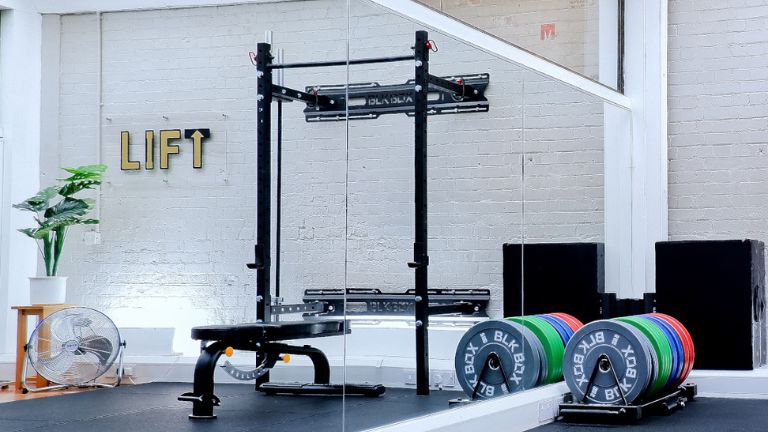Operation weight loss – Healthista’s Olivia Hartland-Robbins joins Lift Studios Fulham to help her get back in shape. With 5 non-negotiable healthy rules to stick by, here is rule number 1 – calorie deficit
‘Mark I’m miserable. None of my clothes fit me and I’ve lost all my confidence’ – these were my exact words as I sat there holding back the tears and asking for weight loss help.
I had gained 17kg’s in 3 years (that’s nearly 40 lbs)! Why? Lockdowns, family illness and job pressures, to name just a few reasons.
Feeling unhealthy, constantly exhausted and insecure meant it was time to make a healthy change. Most of us set goals in January, but the ‘new year, new me’ mentality can often pile on the pressure, so why not start now?
Going from 62kg’s to 79kg’s, I knew I had a long weight loss journey ahead of me to get back to where I wanted to be. So why not get started now, instead of waiting till after Christmas and inevitably gaining more weight?
Personal Training to the rescue

Thankfully Mark Stanton, co-founder of LIFT Studios in Fulham agreed to help me lose weight and gain my confidence back.
And this isn’t the first time Mark has helped me lose weight. Back in 2019 I lost 5kg’s and 7 per cent body fat in just three months, thanks to personal training sessions with Mark and nutrition advice from Nutritionist Emma Bardwell.
READ MORE: I did a body transformation and lost 11 inches – this is what REALLY works for fat loss
Mark has almost two decades of personal training and sports performance coaching under his belt, and has completed an undergraduate degree in Sports Science followed by a Masters in Strength and Conditioning.
Mark knows everything there is to know surrounding the science related to training, without using any complicated or overwhelming explanations. Not only does Mark know how to train professional athletes, he is also a marvel when helping beginners get into great shape and build their confidence around the gym and in themselves – which is EXACTLY what I need right now.
Like a growing number of quality boutique gyms, LIFT Studios offers one-to-one personal training, providing a fully bespoke service to help you reach your goals, with no generic programmes in sight.
Getting started
It was time to take the dreaded ‘before’ measurements. Here’s how the numbers were looking…
| Before Measurements | ||
| Weight kg | 79.6 | |
| Body fat % | 33.6 | |
| Hips cm | 116 | |
| Waist cm | 88 | |
| Stomach cm | 101 | |
| Thighs cm | 58 | |
In terms of goals I told Mark that I didn’t have a specific number or size in mind, I just wanted to feel comfortable in my clothes and improve my energy levels.
Mark suggested that I should aim to lose 10 per cent body fat and see where that left me weight wise – because remember it’s less about what the scales say and more about how you feel in yourself, and of course how your clothes are feeling.
Mark and his team at Lift use a lifestyle medicine based framework to help structure the support and guidance they give you.
I just wanted to feel comfortable in my clothes
Lifestyle medicine is an evidence-based approach to achieving optimal health through replacing unhealthy behaviours with positive ones.
Mark believes the nearer you can get to ‘optimal health’ the greater your results from training will be. Most importantly these results will be longer lasting and maintainable having developed heathy habits and a healthy body along the way.
The key pillars Lift stand by in achieving optimal health are:
- Physical activity
- Diet and nutrition
- Sleep
- Stress and substances
- Social connection
The approach helps to highlight the link between each pillar, showing us how if we struggle with one aspect, it can affect others and jeopardise your health or ability to achieve the best results.
With this in mind mark set 5 rules I have to try to stick to from here on out. Not only is this the starting point, but these rules should also serve as a daily lifestyle goal.
Check back in every day this week, where I will be revealing the five different rules daily…
Rule #1 For weight loss, you need to be in a calorie deficit
Calorie deficit – the well-known buzzword for burning more calories than you consume. In principle it is extremely simple, however in practice it is far from easy.
But what is a calorie? Essentially, a calorie is a unit of energy, and food is measured in calories, which helps people understand how many calories they should consume to meet their own energy needs.
Most of our energy is used up each day just to keep us alive – think breathing, sleeping, digesting, mental focus and more. This is known as your basal metabolic rate (BMR) – aka your metabolic rate of calorie burn even when you aren’t doing anything other than existing.
BMR differs for everyone as factors such as body size, height, weight, activity level, genetics and age all contribute to the amount of calories we burn per day.
READ MORE: Fitness sensation Courtney Black reveals her top 3 calorie deficit tips
We need a certain number of calories each day to function; the NHS recommends 2500 calories a day for men and 2000 calories a day for women (this is including daily exercise).
However the century-old Harris–Benedict equations remain the best available for the prediction of resting energy requirements in healthy, normal-weight individuals.
If you have the time and a calculator to hand here’s how to more accurately work out your BMR:
- Men: BMR = 88.362 + (13.397 x weight in kg) + (4.799 x height in cm) – (5.677 x age in years)
- Women: BMR = 447.593 + (9.247 x weight in kg) + (3.098 x height in cm) – (4.330 x age in years)
Mark informed me that my BMR was 1,609 calories being burnt a day (and remember that’s without doing anything). I was set an initial daily calorie target of around 1600 calories (my BMR).
Now you may think that is quite high, but Mark explains that he wants to encourage physical activity first, and by ensuring I am eating enough calories to function he wants me to create the deficit by increasing my daily exercise rather than cutting down on food.
Mark explains that he wants to encourage physical activity first
For example if I eat 1600kcals a day (what I need to function) and then I walk 10,000 steps in that day, I could have created a 200kcal deficit(ish).
Mark says for all weight loss cases he aims for an initial 10 per cent deficit (of BMR), so 160kcals in my case and then adjusts from there depending on how my body reacts.
The final note on all of this is that all BMR estimates are exactly that, and can still vary by up to 30 per cent, so there will always be a certain amount of trial and error, hence why it is always important to listen and react to your own body, we’re all individuals after all.
READ MORE: The 101 on calorie deficit – how important is it for weight loss?
But of course, your BMR isn’t the only calorie burn you’ll experience day to day. Movement, whether that be a planned exercise session or general movement throughout the day such as getting up and walking around, cleaning, cooking and walking up stairs, will also burn calories.
So add in a gym session and a lunch time walk and you can easily add 400 or so calories to your daily deficit therefore increasing your rate of weight loss.
Tracking calories and macros can be tedious, but in sticking to a calorie deficit it can be extremely beneficial. Using calorie counting apps such as MyFitnessPal, teaches you to be aware of exactly what you’re eating.
So add in a gym session and a lunch time walk and you can easily add 400 or so calories to your daily deficit
Mark asked me to track my calories three days at a time as an educational exercise, because by tracking calories, even if only for a short period of time, you can learn what portion sizes are right for you, how much sugar, carbs, protein and fat you are ingesting on average.
This in turn highlights what adjustments you may be able to make to promote weight loss or whatever fitness goals you may have.
If you truly don’t have time to track your calories or protein via an app, you can opt for an easier version – just write it down in a diary or journal.
Check back in tomorrow for part 2 of the healthy non-negotiable rules to stick by for weight loss.
Like this article? Sign up to our newsletter to get more articles like this delivered straight to your inbox.























































